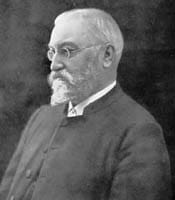
Dr. E.W. Bullinger
(1837-1913)
Ethelbert William Bullinger, born December 15, 1837, in Canterbury, was a renowned scholar in biblical languages, an Anglican clergyman, and a dispensationalist theologian.
Bullinger was raised in a home heavily influenced by the Wesleyan Methodist Doctrine and the strong moral code of the Victorian Era. Bible study, religious service, and music were a part of his everyday life. His unique gift for music allowed him to receive an education at King’s College that he otherwise would not have been able to obtain. He completed the required six terms in a year and a half, leaving King’s College in 1861 as a sound Greek scholar with a mastery of Hebrew. Bullinger married Emma Dodson that year at the age of 23, and together they would have two sons.
In July 1862, Bullinger was ordained into the holy order of priesthood of the Church of England; however, he was still a stranger to that vital experience known as conversion. That would change after a weeknight sermon he delivered in the absence of the Vicar. Bullinger was interested in knowing a particular godly woman’s opinion regarding his sermon but was surprised to learn that her only comment had been, “Poor blind young man.” These words subsequently led to his conversion.
With Bullinger’s salvation came a deep and abiding reverence for the Word of God that is abundantly evident in his sermons and writings. For him, the Bible was the supreme authority, the Word of God, and the revelation to men of the mind and Will of God.
Bullinger’s career in the Church of England spanned from 1861 to 1888. He became primarily known as a recognized scholar in the field of biblical languages. Besides his other ministerial duties, Bullinger was clerical secretary of the Trinitarian Bible Society, which he held until his death in 1913. The society’s accomplishments during his secretariat include:
- The completion and publication of a Hebrew version of the New Testament under a TBS contract with Christian David Ginsburg after the demise of Isaac Salkinson
- The publication of Ginsburg’s first edition of the Tanakh: Introduction to the Massoretico-Critical Edition of the Hebrew Bible
- The formation (1885) of the Brittany Evangelical Mission Society under Pasteur LeCoat and translation of the Bible into Breton
- The first-ever Protestant Portuguese Reference Bible
- Distribution of Spanish Bibles in Spain after the 1868 Spanish Revolution
In 1881, the Archbishop of Canterbury granted Bullinger an honorary Doctor of Divinity degree, and Queen Victoria ordered that the official royal seal be placed on his degree in recognition of his biblical scholarship for publication of The Critical Lexicon and Concordance to the English and Greek New Testaments. Bullinger had designed this resource for ALL ENGLISH BIBLE STUDENTS, especially those unacquainted with Greek. He resigned his vicarage in 1888.
In The Witness of the Stars (1893) Bullinger illustrates the evidence that our hopes of coming glory are strengthened by the prophecies written in the stars, as well as in the Scriptures of truth.
Bullinger began a monthly publication of Things to Come in July 1894 that ran until his death in June 1913. He aimed to reach a large number of general Bible-loving readers and increase their love for the appearance of Christ, the Living Word.
His book Number in Scripture (1894) shows God’s design behind the use of numbers in the Bible. Bullinger believed that if God uses it, it must be with infinite wisdom and glorious perfection. Thus, each number has its own significance, and its harmony is always perfect.
In 1898 he completed a mammoth work entitled Figures of Speech Use in the Bible: Explained and Illustrated. It was so comprehensive and unique that it stands alone in Biblical studies.
How to Enjoy the Bible (1910) continues to be one of Bullinger’s most popular works. It was inspired by the realization that “the Bible is not enjoyed because the Bible is not understood.” Hence, the Bible is a neglected book. Bullinger’s object was to “open the book” to let it speak, to hear its voice, to study it from within itself.
Some of Bullinger’s other well-known works are The Companion Bible, Word Studies on the Holy Spirit, The Book of Job, Great Cloud of Witnesses, and Commentary on Revelation. The underlying principle of his works was “to open the Bible so that all could study it for themselves.”
Bullinger fell asleep in the Lord on June 6, 1913, at 75, leaving behind a legacy of works to help in the study of God’s Word.
